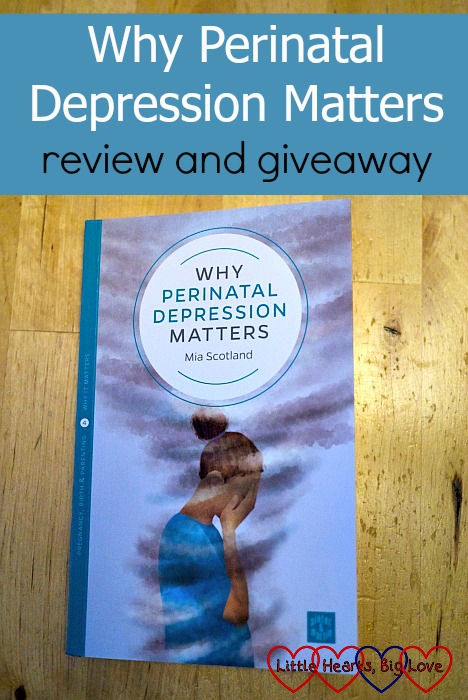The arrival of a new baby is supposed to be one of the most joyful events of our lives. In reality, adjusting to parenthood is incredibly challenging – all of a sudden we have a little person to take care of and no manual to tell us exactly what to do and how to do it. Exhaustion, lack of support, unrealistic expectations, and feelings of being isolated and overwhelmed can take their toll and lead to perinatal depression in both mums and dads.
I’ve blogged before about my experience of postnatal depression and my struggle to bond as a result of it. Why Perinatal Depression Matters, written by clinical psychologist and doula Mia Scotland, is a book I wish I could have read back then. It’s a book that discusses why many women, and men, struggle with perinatal depression; explores the difficulties that arise as a result of the culture that we live in, and provides useful information about treatments that are likely to help.
The book is divided into six chapters – taking the reader through a basic understanding of depression and how our brains work with regards to bonding before discussing perinatal depression specifically in more detail. It also explores how perinatal depression affects fathers, what techniques may help to ease depression and finishes by looking at recovery from perinatal depression.
Throughout the book, the author’s approach is encouraging and positive, reassuring the reader throughout that they are doing well with regards to parenting, whilst reminding them that parenthood is very challenging and that accepting that we need help, and asking for it, is not a sign of weakness. The different feelings associated with depression are discussed and analysed and the myths surrounding perinatal depression debunked. The author looks at how our culture supports new mothers and compares this to how motherhood is celebrated and supported in many other cultures around the world. I found the chapter on everyday techniques for improving psychological wellbeing particularly helpful; there were many suggestions in this chapter that would be helpful for dealing with the day-to-day challenges that parenting brings, with or without struggling with depression as well.
Why Perinatal Depression Matters is currently available from the Pinter and Martin website for £5 but I am offering one of my lucky readers the chance to win a copy. You can enter by filling in the Gleam form below. The competition is open to UK entrants and ends on 15th November 2015 at 11.59PM. Good luck!
Disclaimer: I received a complimentary copy of this book for the purposes of this review. All thoughts and opinions are my own.





By being there for people and not trivialising what they’re feeling x
Offer them help and positive praise
This book sounds really fascinating! I’m currently studying a short course on the effect of the maternal mind on babies and I think this book would be a great complement to that. There’s so much we need to do to support new parents, I think it’s really important to recognise that the support needs to start in pregnancy, it can be a really hard time for both parents and if it’s experienced negatively then that has an impact on life after birth too.
Offer support pregnancy is a massive change
By not competing with everyone else…. It’s not a competition to get your baby to be the first to smile or walk or talk, encourage each other that our babies will develop at their own pace. Competitive parenting is a real bug bear of mine.
by offering helpful advice.
it;s a hard one. I wouldn’t have wanted to go and talk to anyone thats paid to do it, they don’t care really, but perhaps by having adverts on the tv to raise awareness, and Facebook groups so local parents can chat? It’s so hard!
By giving helpful advice and support x
By raising awareness of perinatal depression and uncovering the taboo around it. Many new mums do not want to admit to feeling depressed after birth struggling with perinatal depression alone, as there is a presumption that all new parents feel overwhelming happy with their new arrival.
Listen to them in a non-judgemental way
Explain it happens to alot of us, when you least expect it too X
Just by being there…
Just by offering to listen , and providing encouragement